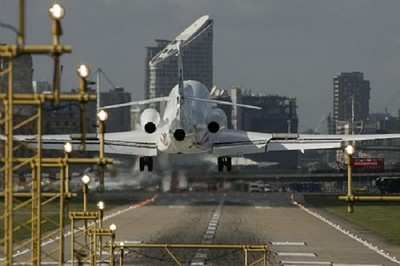Thu, Feb 26, 2009
Trijet Cleared For Steep Approaches
Dassault Falcon announced this week its Falcon 7X recently
received approval for arrivals and departures at London City
Airport (LCY) in London, England.

"Flying into London City was a goal from the early development
of the Falcon 7X program," said John Rosanvallon, President and CEO
of Dassault Falcon. "During these times, speed, access and
efficiency are paramount to all of our customers and this approval
will help ensure 7X operators can remain one step ahead of their
competition."
Dassault boasts the 7X offers the most range and cabin size of
any business jet permitted to fly into and out of London City and
links the heart of one of the world's largest financial centers
with nonstop access to the United States, Europe and the Middle
East.
To operate to and from London City Airport, an aircraft must
demonstrate exacting performance in order to approach, land and
take-off on the airport's short runway (4,327 ft at landing and
3,934 ft at take off) located in the heart of London. It also has
to meet strict environmental standards that manage aircraft noise.
In the case of the Falcon 7X, the noise level was measured in the
same category as a much smaller turboprop.
The operational process for London City approval began in April
of 2008 when Dassault was granted steep approach certification for
the Falcon 7X from the European Aviation Safety Agency (EASA). The
steep approach procedures require a glide slope of 5.5 degrees as
opposed to the standard 3.0 degrees.
Approval flights at London City were performed on October 10,
2008. Dedicated Noise Abatement Departure Procedures (NADP) were
developed and approved by the EASA's Joint Operational Evaluation
Board soon after.
"Flying into London City requires precision and stability in the
handling and speed of the aircraft," said Philippe Deleume, Chief
Test Pilot for Dassault Aviation. "And the digital flight control
system on the Falcon 7X helps to ensure those requirements are met
while landing and departing from one of the world's most
challenging airports."
More News
DETRESFA (Distress Phrase) The code word used to designate an emergency phase wherein there is reasonable certainty that an aircraft and its occupants are threatened by grave and i>[...]
"General aviation is at the forefront of developing and introducing innovative technologies that will transform the entire aviation industry..." Source: Kyle Martin, Vice President>[...]
Direct Straight line flight between two navigational aids, fixes, points, or any combination thereof. When used by pilots in describing off-airway routes, points defining direct ro>[...]
Aero Linx: Women in Corporate Aviation Women in Corporate Aviation support individuals seeking career advancement and professional development in the business aviation industry. Me>[...]
“We would like to thank the many volunteers that help throughout the year to pull off the event, as well as the several reviewers, judges, and SURVICE staff that provide team>[...]
 ANN's Daily Aero-Term (04.26.24): DETRESFA (Distress Phrase)
ANN's Daily Aero-Term (04.26.24): DETRESFA (Distress Phrase) Aero-News: Quote of the Day (04.26.24)
Aero-News: Quote of the Day (04.26.24) ANN's Daily Aero-Term (04.27.24): Direct
ANN's Daily Aero-Term (04.27.24): Direct ANN's Daily Aero-Linx (04.27.24)
ANN's Daily Aero-Linx (04.27.24) Aero-News: Quote of the Day (04.27.24)
Aero-News: Quote of the Day (04.27.24)



